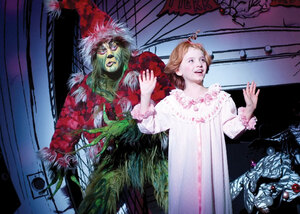Grinch steals show, not holiday cheer, with humor
If Charles Dickens were writing today, he might have taken the easy way out and sent Scrooge to the Pantages Theatre for a heart-warming showing of Dr. Seuss’ How the Grinch Stole Christmas! The Musical, which opened Saturday. It wouldn’t be much of a story, but at least Scrooge would be cured of his misanthropy and Christmas time ill will without the invocation of supernatural phenomena.
But then again, were Dickens writing today, we might not have a Grinch to begin with, let alone Dr. Seuss’ own recreation of Dickens’ famously infamous protagonist/antagonist. Literarily speaking, if Scrooge had a son (and mated with a lime-green she-cat), the result would no doubt be our Grinch — a one-of-a-kind creature out to rid the world of cheer.

Whoville · Stéfan Karl (left) stars as the hideous and bitter title character in Dr. Seuss’ How the Grinch Stole Christmas! The Musical at the Pantages Theatre in Hollywood. The musical adaptation, which also features Kayley Stalling as Cindy Lou Who, runs now until Jan. 3. - Photo courtesy of Broadway LA
Here, potbellied and covered in stringy, moldy hair (Robert Morgan makes some real magic with these costumes), the Grinch is played to perfection by a captivating Stéfan Karl, who frequently breaks the fourth wall in his comical interaction with the crowd. As it should be, Karl — even when it’s only his scraggly extremities reaching out from behind stage walls — steals the show, almost literally in “One of a Kind,” his big solo.
People who had childhoods all know the story, but for those pitiable exceptions whose shelters were rocks, a summary: In his self-imposed isolation atop Mount Crumpit, overlooking the nauseatingly cheery Whoville, the congenitally un-merry Grinch cooks up an evil plot to steal Christmas, the bane of his sorry existence, from the Whos. The Grinch’s only companion is his unloved dog Max (an endearing James Royce Edwards) that is made to aid in his master’s comical villainy.
Of course, all it takes is the friendship of a cute child to enlarge his small heart. Tiny Kayley Stalling’s Cindy Lou Who (alternating here with Issadora Tulalian) is almost unbearably precious. She sings like a cherub, and it’s no wonder the Grinch is reduced to tears after her “Santa for a Day.”
Other notable cast members include five-time Emmy Award-winner John Larroquette, who narrates the play as the older version of Max. Melinda Gilb is a real hoot as Mama Who.
The musical numbers are all similarly charming, especially “It’s the Thought that Counts,” a wonderful send-up of the commercialization of Christmas (the Grinch’s falsetto solo at the end was the best 30 seconds of the night, and that’s saying something).
Kids probably won’t get Dr. Seuss’ veiled critique, but they won’t need to. The story is classic, the performances certainly creditable and the show, thanks largely to Gregory Meeh’s special effects and John Lee Beatty’s stylized sets (based on Dr. Seuss’ sketchbook illustrations), a beauteous marvel to behold.
And at a brisk 90 minutes, there isn’t the moment-killing bustle and shuffle of parents leading their whiny children to the restrooms — well, it isn’t as bad as normal.
The risk with overproducing a show like this — and make no mistake, this is Broadway-style overproduction at its finest — is that we lose a sense of intimacy. Magically, that isn’t the case here. Karl singles out audience members to poke fun at or scare, and a few surprises with confetti turn the Pantages into a winter wonderland that pulls us all inescapably in. Kiddie fare shouldn’t be this good, but it’s a pleasure when it is.
There really isn’t much of a point to indulge in Scrooge-like bah humbuggery. Sure, the narrative stops and starts at times, and the ending may be slightly abrupt, but petty complaints detract from the sheer pleasure of watching this show. For those who haven’t felt the onset of the winter season quite yet — or for those who wish to thaw cold, stony hearts — Dr. Seuss has an answer.
At one point, the two Maxes lead the audience in a sing-along to “You’re a Mean One, Mr. Grinch.” It’s then, when you open your mouth to sing, that you realize you’ve been smiling the whole time.
